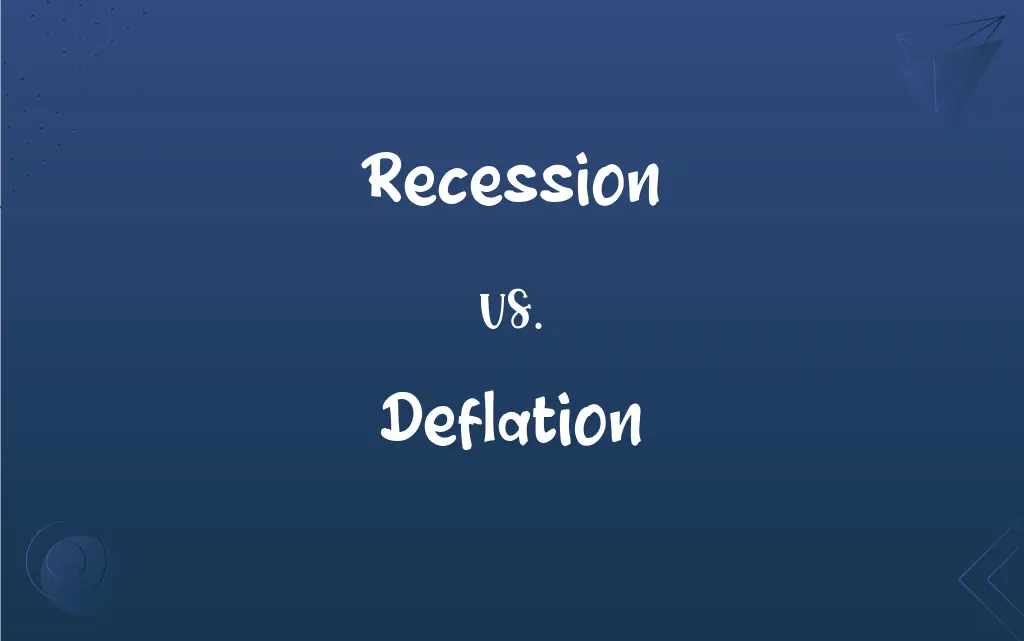Recession vs. Deflation: What's the Difference?
Edited by Aimie Carlson || By Harlon Moss || Published on December 28, 2023
A recession is a period of economic decline, while deflation is a decrease in the general price level of goods and services.

Key Differences
A recession is characterized by a significant decline in economic activity across the economy, lasting more than a few months. Deflation, conversely, refers specifically to a reduction in the general price level of goods and services.
During a recession, key economic indicators like GDP, income, employment, and retail sales fall. Deflation, however, is indicated by a sustained decrease in the price index, affecting consumer and business spending.
A recession is typically identified by negative economic growth for two consecutive quarters. Deflation is measured by a persistent fall in the Consumer Price Index (CPI) or other price measures.
Recessions can be caused by various factors like financial crises, external shocks, or economic imbalances. Deflation often results from reduced demand or increased supply in the economy.
The impact of a recession is broad, affecting jobs, incomes, and production. Deflation's impact is often seen in reduced consumer spending, lower profits for companies, and potential increases in debt burdens.
ADVERTISEMENT
Comparison Chart
Definition
Period of economic decline
Decrease in general price levels
Primary Indicators
Negative GDP growth, unemployment
Falling Consumer Price Index
Duration
Several months to years
Can be short-term or persistently long-term
Typical Causes
Financial crises, policy mistakes, external shocks
Reduced demand, increased supply, monetary policy
Economic Impact
Reduced income, employment, production
Decreased spending, increased debt burden
ADVERTISEMENT
Recession and Deflation Definitions
Recession
A recession is a significant decline in economic activity.
The 2008 financial crisis led to a global recession.
Deflation
Deflation is a decrease in the general price level.
Deflation made consumers delay purchases, expecting lower prices.
Recession
A recession is marked by falling GDP for two quarters.
The economy entered a recession after two quarters of negative growth.
Deflation
Deflation reflects a decline in the cost of living.
During deflation, the purchasing power of money increased.
Recession
A recession involves widespread economic downturn.
The recession caused many businesses to close.
Deflation
Deflation may result from reduced consumer demand.
The economic downturn triggered deflation as people spent less.
Recession
A recession is a period of reduced economic output.
The recession led to high unemployment rates.
Deflation
Deflation is characterized by falling prices.
Deflation led to cheaper goods and services.
Recession
A recession reflects a slowdown in economic growth.
Government spending increased to combat the recession.
Deflation
Deflation can signal an oversupply in the market.
Increased production and reduced demand caused deflation.
Recession
The erosion of a cliff or headland from a given point, as from the action of a waterfall.
Deflation
The act of deflating or the condition of being deflated.
Recession
The reduction of a glacier from a point of advancement.
Deflation
A persistent decrease in the level of consumer prices or a persistent increase in the purchasing power of money.
FAQs
Is a recession always due to financial crises?
No, recessions can be triggered by various factors, not just financial crises.
How is a recession officially declared?
A recession is often declared by economic experts after observing prolonged economic decline.
Do all sectors suffer during a recession?
Most sectors suffer during a recession, but some may be more resilient or even thrive.
What signifies a recession?
A recession is indicated by a sustained period of negative economic growth.
Do governments intervene during recessions?
Governments often intervene during recessions with fiscal and monetary policies to stimulate the economy.
Can a recession be global?
Yes, recessions can be global, affecting many countries simultaneously.
Is deflation always beneficial for consumers?
Not necessarily; while it lowers prices, deflation can also signal economic problems and reduce consumer spending.
Can deflation lead to economic stagnation?
Yes, deflation can lead to economic stagnation by reducing consumer spending and business investment.
Is deflation the opposite of inflation?
Yes, deflation is the opposite of inflation, which is an increase in general price levels.
Can a recession lead to deflation?
Yes, a recession can lead to deflation if it causes a significant drop in demand.
Are job losses a common feature of recessions?
Yes, job losses are common during recessions due to decreased business activity.
How can deflation be countered?
Deflation can be countered by monetary policy, such as lowering interest rates and increasing money supply.
What is deflation?
Deflation is a decrease in the general price level of goods and services.
Can inflation follow deflation?
Yes, inflation can follow deflation if the economy recovers and demand increases.
Can deflation affect debt?
Yes, deflation can increase the real value of debt, making it harder to pay off.
Does a recession affect all countries the same way?
No, the impact of a recession varies based on a country's economic structure and policies.
Is consumer confidence affected during a recession?
Yes, consumer confidence typically declines during a recession, affecting spending and investment decisions.
How long can deflation last?
Deflation can last for a short period or extend for several years, depending on economic conditions.
Are small businesses particularly vulnerable during recessions?
Yes, small businesses are often more vulnerable during recessions due to limited resources.
Can deflation be a sign of technological advancements?
Yes, deflation can sometimes result from increased efficiency and lower production costs due to technological advancements.
About Author
Written by
Harlon MossHarlon is a seasoned quality moderator and accomplished content writer for Difference Wiki. An alumnus of the prestigious University of California, he earned his degree in Computer Science. Leveraging his academic background, Harlon brings a meticulous and informed perspective to his work, ensuring content accuracy and excellence.
Edited by
Aimie CarlsonAimie Carlson, holding a master's degree in English literature, is a fervent English language enthusiast. She lends her writing talents to Difference Wiki, a prominent website that specializes in comparisons, offering readers insightful analyses that both captivate and inform.






































































